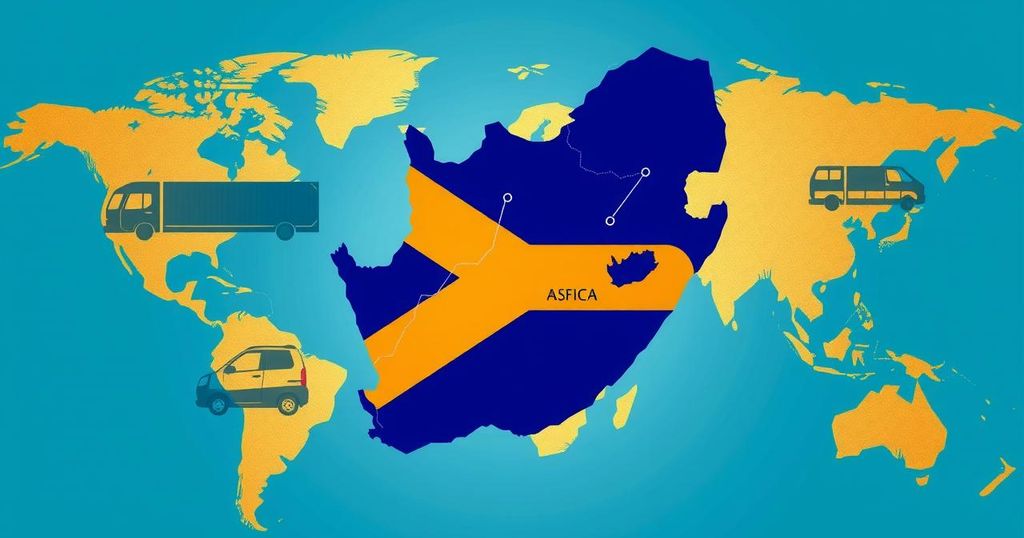Cars
AFRICA, AUTOMOTIVE INDUSTRY, CYRIL RAMAPHOSA, DEPARTMENT, DEPARTMENT OF TRADE, INDUSTRY AND COMPETITION, DONALD TRUMP, DTIC, FOREIGN INVESTMENT, NORTH AMERICA, PAUL, PAULINA MAMOGOBO, PRETORIA, SOUTH AFRICA, SUPPLY CHAIN, TARIFFS, TRADE, UNITED STATES, US, VOLKSWAGEN AG, WASHINGTON
Ethan Kim
0 Comments
South Africa’s Trade Ministry Pursues US Dialogue Amid Automotive Tariffs
South Africa is seeking talks with the US regarding new tariffs that may severely impact its automobile industry, which currently enjoys duty-free access under AGOA. The 25% tariffs set to start on April 3 could harm local manufacturers, leading to considerations for a bilateral trade agreement. Relations between Pretoria and Washington have declined, complicating negotiations.
South Africa’s trade ministry is seeking discussions with the United States as its automotive sector braces for the impact of new tariffs, effective April 3, which will impose a 25% levy on automobile imports, including parts. The Department of Trade, Industry and Competition (DTIC) warned that these duties could negatively affect local manufacturers and harm the economy, despite current duty-free access to the US under a preferential trade agreement.
These tariffs are part of US President Donald Trump’s broader trade policies amid declining relations between Pretoria and Washington. Concerns have arisen regarding the future of the African Growth and Opportunity Act (AGOA), under which a significant portion of South African goods enter the US without tariffs. In 2022, auto exports constituted 64% of South Africa’s total shipments to the US under AGOA, amounting to $2.4 billion, and the automotive industry accounts for over 5% of the nation’s GDP.
The DTIC emphasized that South Africa’s automobile exports pose no threat to the US market, making up just 0.99% of US vehicle imports and 0.27% of auto parts. However, it expects that the new US tariffs will apply to AGOA shipments, similar to previous rulings on steel and aluminum. The tariffs are being instituted under section 232 of the Trade Expansion Act of 1962, cited for national security reasons.
The South African Automotive Business Council, known as Naamsa and including major automotive firms like Volkswagen and Toyota, is lobbying the DTIC for exemptions from the tariffs. Furthermore, South Africa is contemplating a bilateral trade agreement with the US, perceiving this as a preferable alternative to AGOA, advocating for a negotiated deal that offers stability and mutual benefit.
Recent tensions have highlighted deteriorating relations, particularly following actions by the Trump administration, which included the freezing of aid citing unfounded claims of land seizure. Additionally, the US has criticized South Africa’s ties with Iran and Hamas and its international legal actions regarding the Israeli-Palestinian conflict, further complicating the diplomatic landscape.
In summary, South Africa is proactively engaging the US government to mitigate the anticipated adverse effects of new automotive tariffs, which threaten vital trade agreements established under AGOA. With significant economic reliance on vehicle exports, South Africa’s government is considering both lobbying for exemptions and transitioning towards a bilateral trade agreement with the US, underscoring the need for adaptive strategies amid shifting trade policies and deteriorating relations between the two nations.
Original Source: www.newzimbabwe.com




Post Comment